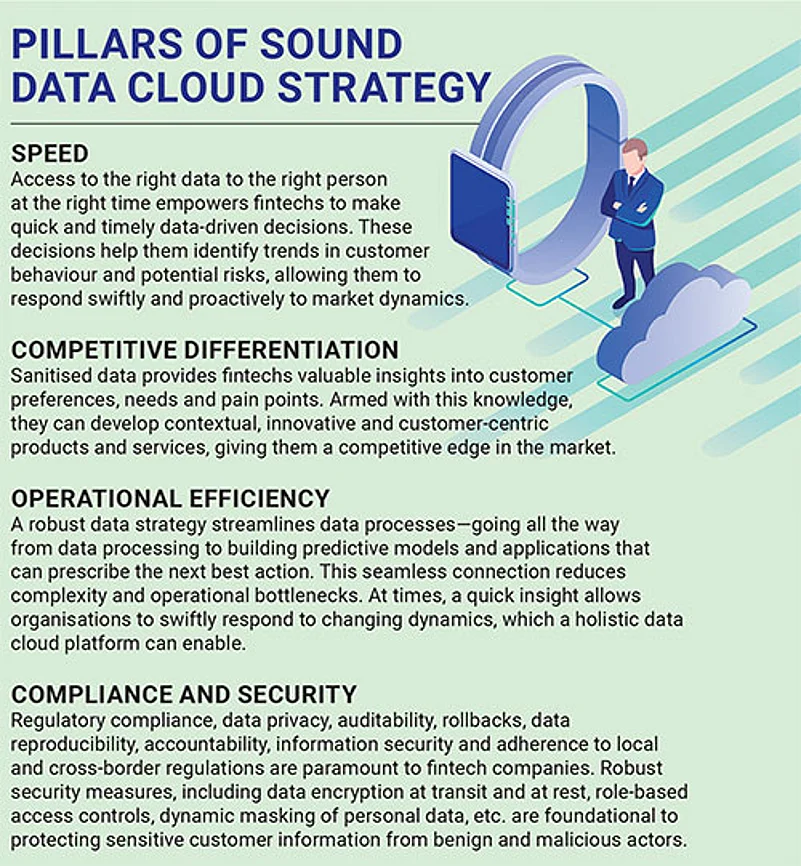The race to go from insights to action drives India’s fintech industry. Catalysed by innovations, like digital payments, UPI, tap-and-go payments and subscriptions, it has become the bedrock of the country's burgeoning digital financial ecosystem, with an ever-increasing demand to cater to a wider customer base safely.
The National Investment Promotion & Facilitation Agency claims that the fintech market opportunity is estimated to be $2.1 trillion by 2030, while the country’s payments landscape is expected to reach $100 trillion in transaction volume and $50 billion in revenue in this period. As these advancements continue to grow at a rapid pace, fintech companies are inundated with customer, transaction and other types of financial data that poses two types of challenges. First is the challenge of data management, which covers the issues of enormous data volume, data posture, data sensitivity and the speed and complexity of data structures. The second challenge involves data utility for product innovation and creating customised solutions while maintaining customer anonymity.
The fintech space is dominated by start-ups that have used product innovation to create a whole new market segment within the larger financial services industry. It is ironical, then, that start-ups are taking time to turn the piles of data they sit on as assets. However, the ones that have taken a leap of faith know that a whole new industry exists around data management and curation for them to join hands with.
The Multi-Channel Challenge
Fintech start-ups were born out of and exist in the cloud, with their multiple channels of data entry forming its various streams. This is where they need data cloud companies to help them manage and leverage their growing data.
Gaurav Lahoti, chief technology officer of Khatabook, states how the billing, inventory, business management and accounting start-up has clear-cut requirements where the data from production databases must be available instantaneously to its operations team. This ensures agility in the data management process to analyse the data in real time and feedback to the platform.
Khatabook engaged the US-headquartered data cloud company Snowflake for data management and its granular access across its different teams. The accounting start-up uses Snowflake to maintain data storage and usage layers, making the same real-time data available to many teams within the organisation within seconds. Once the data is available, it is sought by many teams—marketing, operations, business or product—within the organisation. Snowflake separates computing and storage, making it extremely easy to query the same data across hundreds of dashboards simultaneously,” Lahoti says.

Single-Location Data Agility
The fintech sector sits at the intersection of retail customers, policymakers, regulators and interoperable competitors and partners. This location forces it to seek solutions that can accommodate multiple programming languages, open standards, data engineering workflows and machine learning models to build, deploy, share and monetise applications. At one juncture, fintech start-ups could be collecting transaction data on apps built in their preferred languages and in popular databases, while, at another juncture, they could be porting this data to a regulator’s choice of development ecosystem or communicating with security architecture built on an entirely alien set of code.
A robust data cloud comes to the rescue of fintech players in this situation. To reap the benefits of the data cloud, start-ups tend to formulate a data strategy that is fully managed, secured, governed and transparent on the go. This empowers them to make timely decisions on strategy, develop new products, improve operational efficiency and maintain regulatory compliance. With this approach, they can focus on their core business activities and innovation.
Uni Cards, a rewards-based credit card company whose business logic rests on customer-centric innovation, has gone through this learning curve. Like others in the fintech industry, its key challenges included maintaining data transparency within the organisation and for regulatory purpose, complexity of data structure and cumbersome data management processes in general. Abhishek Gupta, CTO at Uni Cards, says that the fintech is trying to not only solve these problems but go a step further to bring relevant credit-first solutions to contemporary customers. “To achieve this vision, we rely on Snowflake to help us visualise all our data in one place seamlessly and securely. It helps us collaborate among teams without fear of data leakage and make informed decisions based on a comprehensive understanding of our business,” he adds.
Rinesh Patel, head of the financial services industry at Snowflake, claims that the company's data cloud is uniquely positioned to cater to challenges faced by start-ups and allow them to iterate, analyse, innovate and collaborate with data. It does this by breaking down tech and data silos across the client organisation and ultimately enabling its managers to make better decisions with data, he adds.
“Snowflake is enabling firms to remove legacy technology bottlenecks and implement an enterprise data strategy in the cloud with strong governance and controls to identify better discovery and access to data to support business decisions. This gives them a 360-degree view of the customer, hyper-personalisation and improved service levels in financial service,” Patel says.
Snowflake pitches itself as a cloud-native data platform that enables financial services companies to centralise data, bringing in internal and external or structured and unstructured data by reducing onerous data pipelines, something that fintech players may not be capable of doing themselves or incur huge cost if they decide to do so. “Snowflake also enriches data by joining first- and third-party data and lowering extract, load and transform burdens and deepening insights,” Patel elaborates. “Moreover, it can analyse data by scaling limitlessly outwards and upwards on demand without resource contention in Python, Java, Scala and SQL to maximise insights,” he adds.
Cloud to Cloud
Interestingly, Snowflake enables clients to share data across clouds, regions and teams in a governed and secure way to allow better collaboration. This is essential since technology and data strategies are now inseparable when one considers how organisations approach the cloud, moving from being data-informed to becoming more data-driven in their actions and business decision-making.
In the fast-evolving fintech landscape, data cloud companies play a crucial role in enabling, managing, securing and leveraging the colossal amount of data generated. By working closely with fintech companies, they ensure agility in the data management, enabling engineering, analysis and feedback to fintech platforms. While they still have a long way to go, all stakeholders recognise that this is more of a marathon than a sprint and are gearing up for the finish line.































